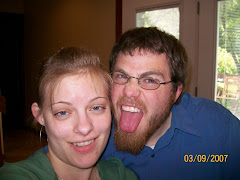We went to a wedding last weekend. Meghan was in the wedding, and looked beautiful, of course. Second wedding for us this summer--I performed the wedding of our nephew, Sean, to his bride, Emily, in mid-May. Both were wonderful events because we got to see family and friends. It is these wonderful people with all their warts and worries (and their willingness to overlook mine) that make life as wonderful as it can be.
Sue and I have moved a lot in our 27+ years of marriage. As a result, we've had to form friendships quickly. Sometimes we've been successful, and at other times, we've come up short. We like our new friends. And, we think they like us. But, the best kind of friends are old friends (which as we get older, seem to be the only kind we've got).
How long do you have to know someone to consider him/her an old friend? I'm not really sure, but I'm beginning to think that old friends are not just people we've known for a long time. No, old friends are the people we click with. They are the sort that we feel comfortable with after only a short time. They are the ones to whom we can say anything, and usually do, often before we even realize we're doing it. Old friends are the ones that make us feel at home, even when we're not. A "new old friend" is someone we want to introduce all our other old friends to because we're so sure that all of us together can have the most wonderful time.
Through the years, I've noted that I do not need a lot of friends to be happy. As I sit in this little bagel place and reflect, I think I need to amend that statement. I don't need a lot of friends that I barely know after 20 years, but I'll take as many old friends as I can get.
Wednesday, June 18, 2008
Tuesday, June 17, 2008
Confession #3
I know, probably too many confessions, but it really is good for the soul.
Since when does being committed to Christ come with a membership card in the NRA? I have read and re-read the second amendment, and I cannot escape the idea that the focus of those words is on the preservation of a well-armed militia. Moreover, since one of the things I teach my students is that context, context, context is the first rule of biblical interpretation (and really of all literature), it seems appropriate to read the constitution's words in light of its original context too. Once we do that, we find that the framers were most concerned more about the common defense of the colonies, a fact that leaves our sometimes rabid defense of the right to keep and bear arms misplaced in this era of a professional and highly-trained military.
Be all this constitutional mumbo jumbo as it may, let's ask the religious question. What does Jesus think about the ready availability of so many guns? Oh, if only we knew. If only He had spoken directly to the issue, we wouldn't have to derive his opinion from other statements! I just have a hard time imagining Jesus, who steadfastly refused to enter into armed conflict (even in the Garden on the night of his trial!), counseling me to take up arms against another human being. Where do we find warrant in the words of the New Testament for the view that self-defense with guns, which almost never happens, is warranted? I think of the words from Revelation 12: They loved not their lives even unto death. Or, those of Acts 14: Through many tribulations we enter the kingdom of God. Or, maybe of Matthew 5, if someone strikes you on one cheek, give him the other one too.
Now, some may say that these statements all refer to suffering for the sake of the gospel. That may in some sense be the case. Yet, Jesus consistently preached about the need to let this life go, and to embrace another life with a different ethic. That ethic, like the hyppocratic oath, is to do no harm. Oh, but I almost forgot the now-familiar retort--Guns don't kill people, people kill people. Actually, I think it goes like this--People with guns kill people (who also may have guns, as it turns out). All in all, I just don't see Jesus strapping on a sidearm and heading into Jerusalem for a showdown with Caiaphas.
Since when does being committed to Christ come with a membership card in the NRA? I have read and re-read the second amendment, and I cannot escape the idea that the focus of those words is on the preservation of a well-armed militia. Moreover, since one of the things I teach my students is that context, context, context is the first rule of biblical interpretation (and really of all literature), it seems appropriate to read the constitution's words in light of its original context too. Once we do that, we find that the framers were most concerned more about the common defense of the colonies, a fact that leaves our sometimes rabid defense of the right to keep and bear arms misplaced in this era of a professional and highly-trained military.
Be all this constitutional mumbo jumbo as it may, let's ask the religious question. What does Jesus think about the ready availability of so many guns? Oh, if only we knew. If only He had spoken directly to the issue, we wouldn't have to derive his opinion from other statements! I just have a hard time imagining Jesus, who steadfastly refused to enter into armed conflict (even in the Garden on the night of his trial!), counseling me to take up arms against another human being. Where do we find warrant in the words of the New Testament for the view that self-defense with guns, which almost never happens, is warranted? I think of the words from Revelation 12: They loved not their lives even unto death. Or, those of Acts 14: Through many tribulations we enter the kingdom of God. Or, maybe of Matthew 5, if someone strikes you on one cheek, give him the other one too.
Now, some may say that these statements all refer to suffering for the sake of the gospel. That may in some sense be the case. Yet, Jesus consistently preached about the need to let this life go, and to embrace another life with a different ethic. That ethic, like the hyppocratic oath, is to do no harm. Oh, but I almost forgot the now-familiar retort--Guns don't kill people, people kill people. Actually, I think it goes like this--People with guns kill people (who also may have guns, as it turns out). All in all, I just don't see Jesus strapping on a sidearm and heading into Jerusalem for a showdown with Caiaphas.
Friday, June 13, 2008
Confession #2
The poor are always with you.
Jesus spoke these words to his disciples, who were questioning him about why he allowed Mary, the sister of Martha and Lazarus, to anoint him with costly perfume shortly before his death. They contended, rightly I might add, that the perfume could have been sold and the proceeds given to the poor. Yet, Jesus knew, as Mary apparently did to some extent as well, that what was in the offing was a crisis of as-of-yet unseen potential. Theologically speaking, it would be a trinitarian crisis as the Son of God suffered torture and death for the sake of us humans and our salvation (so says the Nicene Creed).
So, was Jesus preoccupied? Were his true colors coming out? Was working among the poor not really as important as he had led his followers to believe? Certainly not! Rather, this unique moment in history legitimated Mary's actions.
So, what about the poor? What does Jesus expect of us, his followers, all these years later? At least two things. First, he expects us to read his words honestly, appreciating the context in which they were spoken. Saying that the poor are present always simply means that, ouside of the uniqueness of Jesus' death and resurrection, there is (and always will be) ample opportunity and demand to work for the alleviation of poverty. Second, Jesus demands that resources be given to stem the tide of poverty. The disciples' assessment of the situation would have been correct in any other circumstance. When you think about it, they really had learned this lesson well.
All this makes me wonder about my own life, my priorities, my pursuit of raises and advancement in work. What am I doing to alleviate poverty? Not feeling particularly guilty here, but, honestly, I do not do enough. I do not give enough, to be sure, but I also do not spend enough time among the poor. And, yet, no matter how much I try to ignore poverty, it's always there.
Guess this makes me a liberal too.
Jesus spoke these words to his disciples, who were questioning him about why he allowed Mary, the sister of Martha and Lazarus, to anoint him with costly perfume shortly before his death. They contended, rightly I might add, that the perfume could have been sold and the proceeds given to the poor. Yet, Jesus knew, as Mary apparently did to some extent as well, that what was in the offing was a crisis of as-of-yet unseen potential. Theologically speaking, it would be a trinitarian crisis as the Son of God suffered torture and death for the sake of us humans and our salvation (so says the Nicene Creed).
So, was Jesus preoccupied? Were his true colors coming out? Was working among the poor not really as important as he had led his followers to believe? Certainly not! Rather, this unique moment in history legitimated Mary's actions.
So, what about the poor? What does Jesus expect of us, his followers, all these years later? At least two things. First, he expects us to read his words honestly, appreciating the context in which they were spoken. Saying that the poor are present always simply means that, ouside of the uniqueness of Jesus' death and resurrection, there is (and always will be) ample opportunity and demand to work for the alleviation of poverty. Second, Jesus demands that resources be given to stem the tide of poverty. The disciples' assessment of the situation would have been correct in any other circumstance. When you think about it, they really had learned this lesson well.
All this makes me wonder about my own life, my priorities, my pursuit of raises and advancement in work. What am I doing to alleviate poverty? Not feeling particularly guilty here, but, honestly, I do not do enough. I do not give enough, to be sure, but I also do not spend enough time among the poor. And, yet, no matter how much I try to ignore poverty, it's always there.
Guess this makes me a liberal too.
Thursday, June 12, 2008
Confession #1
I have a confession to make, actually several confessions, which I plan to be making in this very open forum. I am a liberal. (It's kind of liberating to see it in print, and not just think it.) I believe freedom of speech is sacrosanct. It's no accident that this freedom is first in the Bill of Rights. In my opinion, freedom of speech is the liberty that we Americans should guard more carefully than any other. Without it, freedom begins to ebb from our grasp as sand through even the most tightly clinched fist. Indeed, the others all depend on the constitutional guarantee to express ourselves in the ways we see fit.
In fact, I hesitate to endorse any restriction on our right to express ourselves. Of course, this means that even unpopular and vulgar speech has a right to exist, constitutionally speaking. Do I like that kind of speech? No. Do I think vulgar speech has any intrinsic value? Again, no. As a Christian, I cannot and will not endorse such speech. But, do I believe it is my job to stamp out such speech? NO! What should do I do then if I find vulgar speech, well. . . vulgar? I must compete and overcome the profane in the marketplace of ideas because my experience leads me to believe that the sordid nature of the human mind cannot be overcome with more legislation. Thus, the task for Christians is to allow the light and love of Christ to transform the person from the inside out, replacing the desire for the sewer with a yearning for the sublime.
Problem is, this is an extremely hard task, and a long one too. However, I would contend (1) that this task yields the greater results and (2) that this is where Jesus Himself competes. If Jesus had intended to form a new political regime wherein He ruled with an iron fist and subjugated all of humanity to him the first time around, he could have done so. He chose to take a redemptive course instead, a course wherein he competes for and wins the hearts and minds of his followers, if they be His followers. And, then, he commited this same agenda to us, His co-laborers. Thus, the task before us is not passing a legislative agenda in which people's rights (even their rights to do evil) are restricted, but overcoming evil with good, especially good ideas.
I guess this makes me a liberal.
In fact, I hesitate to endorse any restriction on our right to express ourselves. Of course, this means that even unpopular and vulgar speech has a right to exist, constitutionally speaking. Do I like that kind of speech? No. Do I think vulgar speech has any intrinsic value? Again, no. As a Christian, I cannot and will not endorse such speech. But, do I believe it is my job to stamp out such speech? NO! What should do I do then if I find vulgar speech, well. . . vulgar? I must compete and overcome the profane in the marketplace of ideas because my experience leads me to believe that the sordid nature of the human mind cannot be overcome with more legislation. Thus, the task for Christians is to allow the light and love of Christ to transform the person from the inside out, replacing the desire for the sewer with a yearning for the sublime.
Problem is, this is an extremely hard task, and a long one too. However, I would contend (1) that this task yields the greater results and (2) that this is where Jesus Himself competes. If Jesus had intended to form a new political regime wherein He ruled with an iron fist and subjugated all of humanity to him the first time around, he could have done so. He chose to take a redemptive course instead, a course wherein he competes for and wins the hearts and minds of his followers, if they be His followers. And, then, he commited this same agenda to us, His co-laborers. Thus, the task before us is not passing a legislative agenda in which people's rights (even their rights to do evil) are restricted, but overcoming evil with good, especially good ideas.
I guess this makes me a liberal.
Labels:
Christian liberalism,
first amendment,
Jesus,
liberal,
transformation
Subscribe to:
Posts (Atom)





